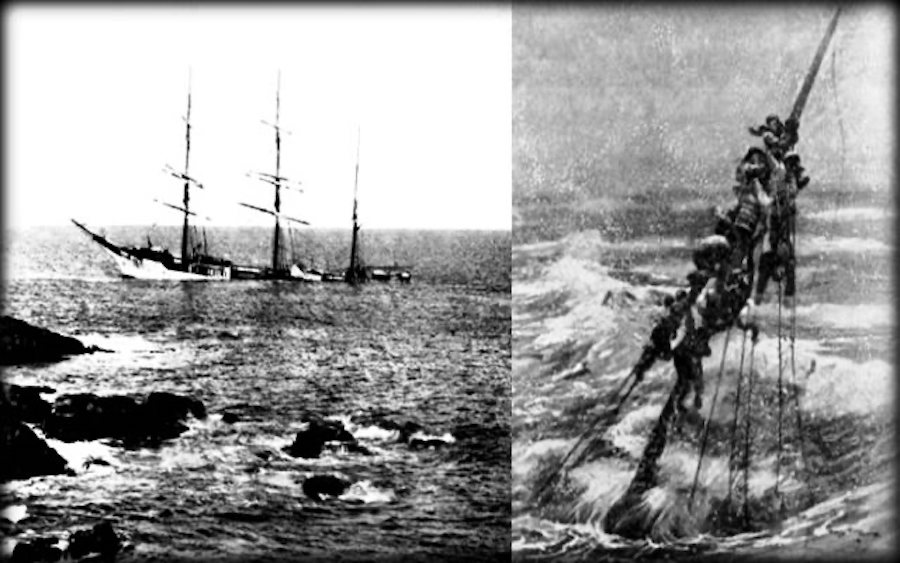Alberto Moroy is an old, and esteemed, friend to the blog. He writes for the Uruguayan newspaper El País, publishing fantastic articles on the history, and stories, of Uruguay and Argentina. And naturally, the Basques play a leading role in these stories, and to understand this, all one has to do is take a look at the White Pages of either country. We’ve collected a few of them, always excited by how interesting they are.
This weekend, he published an extraordinary article about the June 9,1842 sinking of the sailboat Leopoldina Rosa off Cape Polonio, and the northern Uruguay coast. The wreck took the lives of 231 of the 303 passengers aboard the schooner, most of them Basque, most of them women and children. The tragic tale is made even more so by the heartbreaking stories inside it.
Alberto Moroy uses the “excuse” of this tragedy to share with is the terrible conditions the Basques of the first half of the 19th century had to endure on the long trip to the New World, and then again when they arrived. They were traveling there, we must recall, because they were fleeing the awful consequences that the abolition of the fueros caused in Basque territories on both sides of the Pyrenees. Again, we must remember that Basques from all seven territories were going there, as brothers even more tightly joined together by the tragedy their homeland was forced to endure due to Jacobian liberalism.
When we read it (that’s where we got the title from), we could help but draw comparisons between the tragedies those compatriots of ours went through and those being endured by other human beings who are fleeing misery, oppression, and war, dying in the hundreds at the gates to Europe, living mistreated and marginalized in a place they thought would be their land of opportunity.
Exactly five years ago, on September 19, 2015, we wrote an article in the “Stories of the Basques” section of the newspaper Deia on this topic. This was the result of a blog entry in which we recalled, at their height of the refugee crisis in Europe, that we had had to go through the same things they were going through then, and still are now. And sadly, the article is still current, because the situation is unchanged, if not worse.
«Arribaban a Montevideo o Buenos Aires; escogía el consignatario los que quería, y los demás, hombres, mujeres y niños, puestos en una barraca a usanza de la que se estila en los bazares mahometanos, pasaban a la servidumbre temporal del primero que satisfacía el importe de su viaje…»
“They arrived at Montevideo or Buenos Aires; the consigner chose the ones he wanted, and the rest, men, women, and children, were put in the kind of hut used in Mohammedan bazaars, entering into the indentured servitude of the first person to pay their fare… “
Back then, there were people who wrote to us saying that we were mistaken, that unlike those “shabby” immigrants we were comparing the Basque emigrants to, “our people” went to the Americas with “elegance and dignity”. They already had jobs lined up, and were warmly received with open arms, never stealing anyone else’s jobs. Of course, since they were Basque, they were good people.
Nothing could be further from the truth. They were exploited, persecuted, denigrated, harassed, and even killed for being immigrants.
The image they have of the Basques on the other side of the ocean almost 200 years after the sinking of the Leopoldina Rosa is very different. And this is down to the fact that the Basques arrived, stayed, and proved who they really were. This was helped by the fact that before them, other Basques had already established themselves during colonial times and proven their worth.
But we mustn’t fool ourselves. Over the centuries, our compatriots have left the homeland with “one hand ahead and one hand behind,” looking for opportunities. In many cases, they were forced to take the worst jobs, in the worst conditions. Many of them were not warmly received, nor did they enjoy the “good fame” of being Basque.
They built their prestige with their hard work. The idea, 1uite common in many parts of South America, of using the expression “palabra de vasco” (Basque honor, word of a Basque) to convey that something is sure did not arrive with them. They made it a reality over many long years.
But to get there, they had to be given the opportunity. And now it is we who have to give an opportunity to others. This is true simply for the sake of humanity. But if we forget that, we must remember that we as a nation owe the world a debt. And Basques pay their debts.
Thank you, Alberto Moroy, for sharing these stories of Basques in the Americas, and thank you for giving us the opportunity to remember that those of us who left back then are not very different from those of the others who are coming here now.
We’re sharing the article published this weekend in El País; an article about similar topics to be found on EuskoNews by Alberto Irigoyen Artetxe; and the blog articles we referenced earlier.
El País -19/9/2020 – Uruguay
La sudestada que ahogó 200 vascos; mujeres y niños principalmente
Pocos imaginan el terrible poder de una sudestada particularmente en las inmediaciones de Valizas y el Cabo Polonio. Los inmigrantes tampoco imaginaban que los iban a traficar como esclavos por la letra chica de un contrato. Y menos suponían, que quienes lograban llegar a la costa, caían en manos de malhechores que se apoderaban de todo.
(Follow) (Automatic translation)
Euskonews – – Euskadi
Una historia de inmigrantes, travesías y naufragios
Como obligados medio de transporte hasta bien entrado el siglo XX, la imagen de los veleros, que impusieron su indiscutida supremacía desde el descubrimiento hasta mediados del siglo diecinueve, y los vapores a partir de allí, se encuentran íntimamente vinculadas a la emigración europea a América. En virtud de ello, es común hallar, tanto en los estudios migratorios como en las crónicas o prensa de la época, frecuentes alusiones a las virtudes y sinsabores de una no siempre placentera travesía atlántica.
(Follow) (Automatic translation)
“I only ask God to not let me be indifferent to the pain” (Article and video)
https://aboutbasquecountry.eus/2011/05/04/un-articulo-sobre-la-historia-negra-de-la-emigracion-vasca-a-america/
Last Updated on Dec 20, 2020 by About Basque Country





